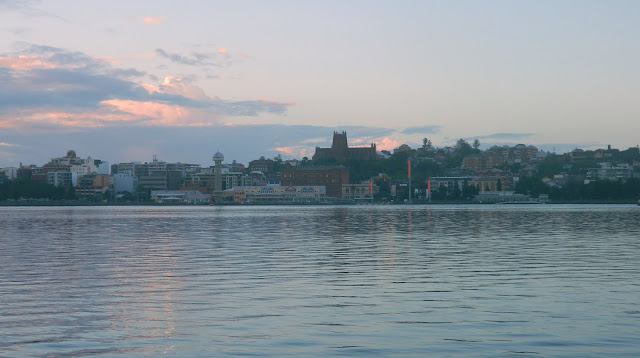I've never seen an argument against same sex marriage that made me think "hmm, you may have a point there". Arguments against are usually filled with historical inaccuracies, shoddy reasoning, half-truths and evoking a time that never existed outside of the hazy memories of conservative columnists. So it is with this piece by Kevin Andrews in today's Sydney Morning Herald. As can be expected, the former Howard government minister is against it. Also to be expected, the arguments he uses aren't exactly robust:
The one thing that is studiously avoided by the proponents of same-sex unions is the purpose of marriage. Historically, marriage is about the protection of children.
Historically, marriage is about the protection of property, specifically a man's property. The woman he married became his property; his worldly goods would pass down to the legitimate sons who bore his name. Marriage originated in order to secure distribution of assets.
Today there is another, competing view of marriage. Instead of a pro-child social institution, some propose that marriage be based on the gratification of (two) consenting adults. Hence, the self-fulfilment of adults is to replace the social institution centred on the well-being of children.
Even if this point wasn't historically inaccurate, considering straight people can marry and choose not to have children, or marry past reproductive age, or marry and make their childrens' lives hell, or marry and divorce, why should same sex attracted people be the ones to miss out for the sake of the children?
It also ignores the overwhelming social science evidence that such an arrangement is optimal for the well-being of children and the welfare of society
Show me any evidence at all that children being raised by same sex couples are any worse off than children of married straight parents. I'll wait here.
Secondly, it politicises the institution of marriage in a novel and dangerous manner, and extends the role of the state beyond its rightful place. Marriage does not require the state to do anything. However, a redefinition can only occur by state decree. Marriage is no longer a fundamental institution of civil society, but a right, granted by the state.
Are you taking the mickey, Mr Andrews? First of all, marriage has already been redefined by law. We have redefined it as an equal partnership rather than the man having legal possession over the woman. Secondly, politicising marriage? Whilst in government, your party, uniquely in the developed world, actually banned same sex marriage (rather than merely not legalising it) and actually amended the Marriage Act, requiring couples being married to recite vows reinforcing your inaccurate and outmoded definition of marriage - but only if they were married in a civil ceremony (apparently us non religious types can't be trusted to understand just what a sacred reworked institution marriage is). If that's not politicising marriage for your own ends, what the hell is?
It's been said, not wrongly, that the divide on legalising same sex marriage in Australia isn't left-right, but a generational divide. I'm not sure what to blame for Mr Andrews' views, but why do we still need to see crud like this in the mainstream media?
The one thing that is studiously avoided by the proponents of same-sex unions is the purpose of marriage. Historically, marriage is about the protection of children.
Historically, marriage is about the protection of property, specifically a man's property. The woman he married became his property; his worldly goods would pass down to the legitimate sons who bore his name. Marriage originated in order to secure distribution of assets.
Today there is another, competing view of marriage. Instead of a pro-child social institution, some propose that marriage be based on the gratification of (two) consenting adults. Hence, the self-fulfilment of adults is to replace the social institution centred on the well-being of children.
Even if this point wasn't historically inaccurate, considering straight people can marry and choose not to have children, or marry past reproductive age, or marry and make their childrens' lives hell, or marry and divorce, why should same sex attracted people be the ones to miss out for the sake of the children?
It also ignores the overwhelming social science evidence that such an arrangement is optimal for the well-being of children and the welfare of society
Show me any evidence at all that children being raised by same sex couples are any worse off than children of married straight parents. I'll wait here.
Secondly, it politicises the institution of marriage in a novel and dangerous manner, and extends the role of the state beyond its rightful place. Marriage does not require the state to do anything. However, a redefinition can only occur by state decree. Marriage is no longer a fundamental institution of civil society, but a right, granted by the state.
Are you taking the mickey, Mr Andrews? First of all, marriage has already been redefined by law. We have redefined it as an equal partnership rather than the man having legal possession over the woman. Secondly, politicising marriage? Whilst in government, your party, uniquely in the developed world, actually banned same sex marriage (rather than merely not legalising it) and actually amended the Marriage Act, requiring couples being married to recite vows reinforcing your inaccurate and outmoded definition of marriage - but only if they were married in a civil ceremony (apparently us non religious types can't be trusted to understand just what a sacred reworked institution marriage is). If that's not politicising marriage for your own ends, what the hell is?
It's been said, not wrongly, that the divide on legalising same sex marriage in Australia isn't left-right, but a generational divide. I'm not sure what to blame for Mr Andrews' views, but why do we still need to see crud like this in the mainstream media?












